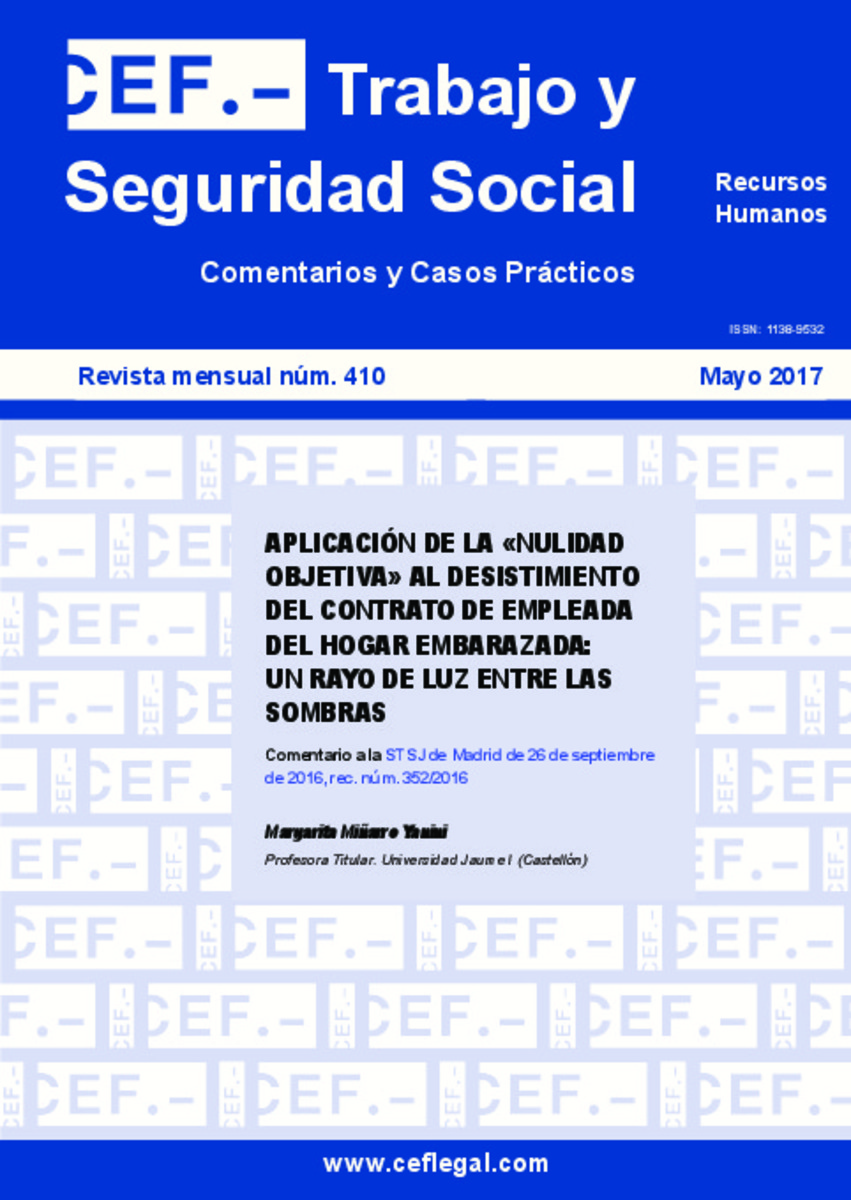Mostrar el registro sencillo del ítem
Aplicación de la «nulidad objetiva» al desistimiento del contrato de empleada del hogar embarazada: un rayo de luz entre las sombras (Comentario a la STSJ de Madrid de 26 de septiembre de 2016, rec. núm. 352/2016)
| dc.contributor.author | Miñarro Yanini, Margarita | |
| dc.date.accessioned | 2017-10-18T07:43:40Z | |
| dc.date.available | 2017-10-18T07:43:40Z | |
| dc.date.issued | 2017-05 | |
| dc.identifier.citation | MIÑARRO YANINI, Margarita. Aplicación de la «nulidad objetiva» al desistimiento del contrato de empleada del hogar embarazada: un rayo de luz entre las sombras (Comentario a la STSJ de Madrid de 26 de septiembre de 2016, rec. núm. 352/2016). Estudios Financieros: Revista de Trabajo y Seguridad Social (2017), n. 410, p. 132-137 | ca_CA |
| dc.identifier.uri | http://hdl.handle.net/10234/169424 | |
| dc.description.abstract | Si debiera destacarse únicamente dos características socio-jurídicas del servicio de hogar familiar en España al margen de su muy frecuente opacidad, estas podrían ser la de estar absolutamente feminizado y contar tradicionalmente con una regulación jurídica notablemente inferior a la común en cuanto a garantías laborales , interpretadas en sentido extenso. Si bien la Ley 27/2011, de 1 de agosto, sobre actualización, adecuación y modernización del sistema de Seguridad Social, modificada por el Real Decreto-Ley 29/2012, de 28 de dicembre, de mejora de la gestión y protección social, y el Real Decreto 1620/2011, de 14 de noviembre, por el que se regula la relación laboral de carácter especial del servicio de hogar familiar, supusieron una mejora tanto desde el punto de vista de seguridad social como laboral, respectivamente, mantuvieron todavía importantes aspectos diferenciales, que determinan que siga siendo una relación laboral marginada en cuanto a derechos. | ca_CA |
| dc.description.abstract | If two socio-legal characteristics were to be highlighted from the domestic service provision in Spain, besides its frequent lack of transparency, those would be both the fact that it is highly feminised and the fact that, traditionally, its legal regulations have been remarkably below average regarding employment guarantees, in a broad sense. On the one hand, an improvement in terms of work conditions and social security was introduced by the Spanish Law 27/2011, of 1 August, on the update, adaptation and modernisation of the Social Security system, amended by both the Royal Decree-Law 29/2012, of 28 December, on the improvement of social protection and management, and the Royal Decree 1620/2011, of 14 November, regulating the special work relationships of domestic service provision. Yet, they failed to address specific differences, making domestic service provision a marginalised profession in terms of labour rights. | |
| dc.format.extent | 10 p. | ca_CA |
| dc.format.mimetype | application/pdf | ca_CA |
| dc.language.iso | spa | ca_CA |
| dc.publisher | Centro de Estudios Financieros | ca_CA |
| dc.relation.isPartOf | Estudios Financieros: Revista de Trabajo y Seguridad Social (2017), n. 410 | ca_CA |
| dc.rights.uri | http://rightsstatements.org/vocab/CNE/1.0/ | * |
| dc.subject | Employee's home | ca_CA |
| dc.subject | Laws | ca_CA |
| dc.subject | Employer | ca_CA |
| dc.subject | Social Security | ca_CA |
| dc.subject | Empleadas de hogar | |
| dc.subject | Leyes | |
| dc.subject | Empleador | |
| dc.subject | Seguridad Social | |
| dc.title | Aplicación de la «nulidad objetiva» al desistimiento del contrato de empleada del hogar embarazada: un rayo de luz entre las sombras (Comentario a la STSJ de Madrid de 26 de septiembre de 2016, rec. núm. 352/2016) | ca_CA |
| dc.type | info:eu-repo/semantics/article | ca_CA |
| dc.rights.accessRights | info:eu-repo/semantics/openAccess | ca_CA |
| dc.relation.publisherVersion | http://www.laboral-social.com/comentario-stsj-madrid-26-septiembre-2016-rec-num-352-2016.html | ca_CA |
| dc.type.version | info:eu-repo/semantics/publishedVersion | ca_CA |
Ficheros en el ítem
Este ítem aparece en la(s) siguiente(s) colección(ones)
-
DTR_Articles [240]







